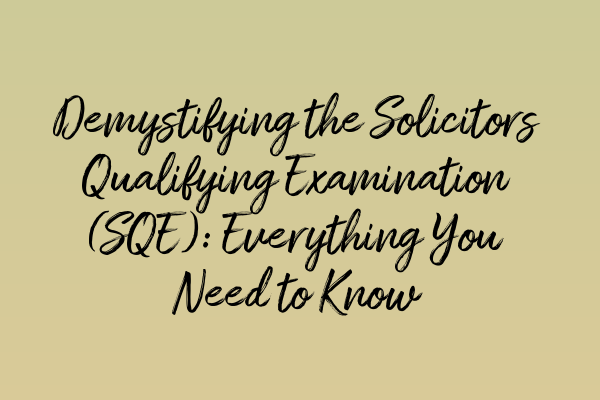Demystifying the Solicitors Qualifying Examination (SQE): Everything You Need to Know
Aspiring solicitors, are you ready to embark on an exciting journey towards becoming qualified legal professionals? The Solicitors Qualifying Examination (SQE) is a critical step in your career path, and it’s essential to have a clear understanding of what it entails. In this comprehensive guide, we will demystify the SQE, covering everything you need to know to navigate this challenging but rewarding process.
1. What is the SQE?
The SQE is a new assessment framework introduced by the Solicitors Regulation Authority (SRA) to replace the traditional route to qualification as a solicitor in England and Wales. This new system aims to provide a more flexible and accessible approach to qualifying as a solicitor, ensuring consistency and high standards across the profession.
If you’re currently enrolled in the Legal Practice Course (LPC) or considering pursuing a career in law, understanding the key elements of the SQE is crucial.
2. Structure of the SQE
The SQE is divided into two stages: SQE1 and SQE2. Both stages consist of multiple assessments designed to evaluate your knowledge and skills in various areas of law.
2.1 SQE1
SQE1 is the first stage of the examination and focuses on testing your functioning legal knowledge. It is a computer-based multiple-choice test, covering subjects such as:
- Constitutional and Administrative Law
- Contract Law
- Criminal Law
- Property Law
- Tort Law
- And more…
To succeed in SQE1, it’s essential to have a comprehensive understanding of these foundational subjects. Familiarize yourself with each area and invest time in thorough preparation.
2.2 SQE2
SQE2 is the second stage of the examination and focuses on assessing your practical legal skills. This stage consists of various types of assessments, including:
- Client interviewing
- Advocacy
- Legal research and writing
- Case and matter analysis
- Legal drafting
- And more…
During SQE2, you will be required to perform these tasks in simulated real-life scenarios, demonstrating your ability to apply legal knowledge effectively. Immersing yourself in practical training and honing your skills will be crucial for success in this stage.
3. Preparing for the SQE
Now that you have an overview of the SQE structure, it’s time to focus on how you can best prepare for these assessments.
3.1 Resources and Study Materials
Start by gathering comprehensive study materials and resources that cover the subjects tested in SQE1. Online course providers, textbooks, and past papers are excellent tools to aid your learning process.
By using high-quality study materials, you can ensure you’re covering all the necessary topics and familiarizing yourself with the types of questions you may encounter in the examination.
Take advantage of the related articles below to supplement your understanding of specific areas of law:
Private Prosecutions: Exploring Non-Governmental Prosecutions in Criminal Cases
Understanding Drug-related Offences: Laws and Penalties in the UK
Demystifying Criminal Law Procedures: A Step-by-Step Guide
Rights of the Accused: Protecting Individual Liberties in Criminal Proceedings
Magistrates’ Court vs Crown Court: Understanding Key Differences
3.2 Practice Questions and Mock Exams
Studying alone may not be sufficient to succeed in the SQE. To have a realistic experience of the examination, it’s crucial to attempt practice questions and mock exams.
Practice questions will help you familiarize yourself with the format and style of the assessments, allowing you to identify any knowledge gaps and improve your time management skills. Mock exams can provide a simulated test environment, enabling you to gauge your readiness for the actual examinations.
3.3 Utilize Training Providers
Consider enrolling in SQE preparation courses offered by reputable training providers. These courses are specifically tailored to prepare you for the SQE assessments, providing expert guidance and support throughout the learning process.
Training providers often have experienced tutors who can provide valuable insights, feedback, and additional resources to enhance your understanding and performance.
4. Key Dates and Registration
Keep track of the key dates for the SQE assessments and registration deadlines. Stay up to date with the SRA’s official website and other reliable sources for the latest information.
Ensure you register for the SQE within the specified timeframe to secure your spot for the examinations. Late registrations may incur additional fees or the risk of missing out altogether.
5. The Future of Legal Qualification
The introduction of the SQE represents a significant change in the legal profession’s qualification process. Its aim is to streamline the route to qualification and produce competent and adaptable solicitors equipped with the necessary skills to excel in legal practice.
It’s important to embrace this change and stay updated with any developments or updates from the SRA. Familiarize yourself with the details of the SQE and take the necessary steps to prepare yourself adequately for these new assessments.
By investing time and effort in your preparation, leveraging quality resources and training providers, and keeping yourself informed, you’ll be well on your way to conquering the SQE and launching a successful legal career.


Leave a Reply